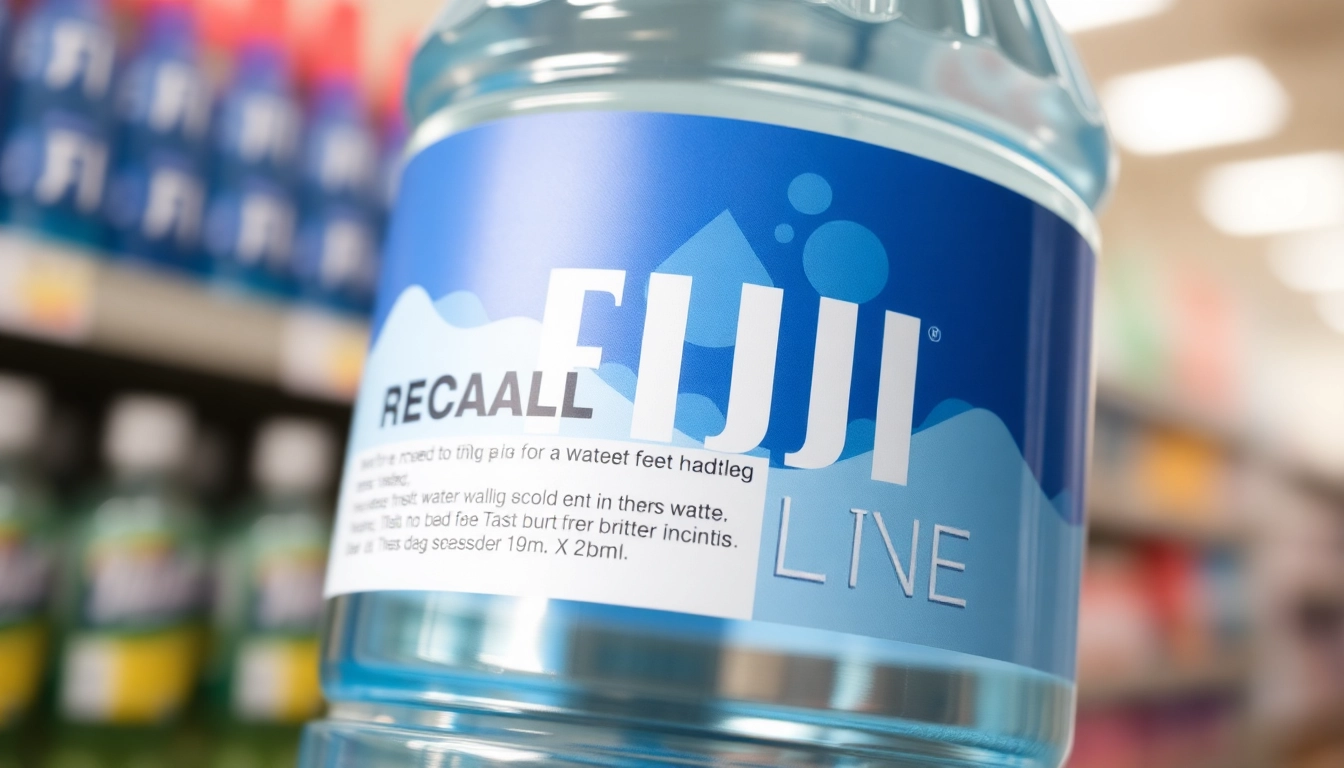Understanding the Fiji Water Recall 2024: What You Need to Know

Overview of the Fiji Water Recall 2024
The Fiji Water recall of 2024 has raised significant concerns among consumers of bottled water, particularly regarding safety and health implications. This recall was initiated by fiji water recall 2024 due to the discovery of harmful contaminants in its products. To understand the full scope of this recall, it is imperative to explore what triggered the action, the timeline of events, and the specific products affected.
What Triggered the Recall?
The recall was primarily driven by laboratory tests that identified elevated levels of manganese, a mineral that, while present in natural water sources, can pose health risks when found in excessive amounts. Alongside manganese, certain bottles were reported to contain bacteria, which added another layer of concern for public health. These findings prompted the company, Natural Waters of Viti Limited, to act swiftly in recalling nearly 1.9 million bottles of their well-known Fiji Natural Artesian Water, particularly the 500 mL 24-pack size.
Timeline of Events Surrounding the Recall
The sequence of events began in early March 2024, when initial testing flagged concerns regarding the water quality. By March 4, the recall had officially been initiated. It was an unusual and pivotal moment for a brand synonymous with purity and health. As news of the recall spread, consumers began to seek clarity on which products were impacted, leading to additional updates from the FDA and the company. On May 23, updates were released detailing the specific UPC codes affected, enhancing public awareness and facilitating the return process for consumers.
Key Facts About Affected Products
- Product Type: Fiji Natural Artesian Water.
- Volume: 500 mL bottles sold in packs of 24.
- UPC Codes: Case UPC Code: 6 32565 00004 3, Bottle UPC Code: 6 32565 00001 2.
- Production Dates: Waters produced on November 11, 12, 13, 24, and 25, 2023.
- Recall Number: F-1264-2024.
Health Implications of the Recall
Understanding the health implications tied to the recalled Fiji water is crucial for consumers who may have purchased the affected products. This section dives into the potential risks associated with contaminants found in the water, along with guidance on recognizing symptoms that may arise from exposure.
Risks Associated with Contaminated Water
Contaminated water can lead to various health issues, triggering symptoms ranging from mild gastrointestinal distress to more severe illnesses. Manganese, while essential in trace amounts for bodily functions such as bone formation and blood clotting, becomes a concern when ingested in excess. Its presence can result in neurological issues, particularly in individuals with compromised health. Additionally, exposure to bacteria can lead to infections and gastrointestinal problems, raising the collective alarm regarding the safety of Fiji water during this recall period.
Identifying Symptoms from Contaminants
Awareness of symptoms that may indicate contamination is essential for consumers. Those who consume contaminated water may experience nausea, vomiting, diarrhea, fatigue, and headaches. Particularly vulnerable populations, such as children and individuals with weakened immune systems, should be particularly vigilant. If consumers experience any of these symptoms following the consumption of affected Fiji water, they are advised to seek medical attention promptly.
Expert Insights on Water Safety
To gain deeper insights into the implications of the Fiji water recall, experts in the field of public health and water safety have weighed in. Many emphasize the importance of rigorous testing and quality control measures within the bottled water industry. Furthermore, they advocate for consumer education regarding water safety, urging individuals to familiarize themselves with proper identification techniques for potentially hazardous products, and reminding them to stay informed about recalls.
How to Check if Your Fiji Water is Affected
For consumers who want to determine whether their Fiji water purchases fall under the recall, clear, actionable steps are necessary. Here, we outline how to check for affected products accurately.
Detailed UPC Codes to Look For
As previously mentioned, UPC codes are vital for identifying whether bottles are part of the recall. Consumers should check for the following codes:
- Case UPC Code: 6 32565 00004 3
- Bottle UPC Code: 6 32565 00001 2
Additionally, the specific production dates are essential, with recalls covering waters produced on November 11, 12, 13, 24, and 25 of 2023. If your purchase matches these details, it falls within the recall parameters.
Where to Find Recall Information
Consumers should leverage multiple sources for the most current recall information. Official announcements from the FDA, updates on the company’s website, and local news outlets can provide valuable insights. It’s advisable for consumers to stay connected to health-focused news platforms and social media channels, as these often disseminate important updates quickly.
Steps for Reporting Concerns
If consumers believe they have purchased affected Fiji water products, they are encouraged to report their concerns. Here’s how:
- Document the UPC codes and production dates on the affected bottles.
- Contact customer service for Natural Waters of Viti Limited, providing them with necessary information for identification.
- Follow any instructions provided to initiate the formal recall process.
Customer Guidance Post-Recall
In the wake of the recall, guidance for affected customers is paramount. This section outlines practical steps for refunds or replacements, communication with retailers, and how to stay informed on future recalls.
How to Refund or Replace Your Purchase
For customers wanting to refund or replace their affected Fiji water, the process is fairly straightforward. The company has established guidelines to facilitate refunds:
- Visit the official Fiji Water website or call their customer service directly.
- Provide proof of purchase and specify the affected product details, including UPC codes.
- Follow the steps outlined by the customer service representative for processing refunds or replacements.
Communicating with Retailers for Support
Consumers who purchased Fiji water from local retailers should also communicate directly with those stores. Most retailers will have a return policy in place for recalled products. Customers should bring affected bottles back to the store where they purchased them, along with any proof of purchase, for assistance in processing returns or exchanges.
Staying Informed About Future Recalls
To continue safeguarding themselves from potential contaminants in bottled water, consumers should register for recall alerts related to food and beverage products. Signing up for notifications via the FDA’s website can help consumers remain knowledgeable about any future recalls affecting bottled water brands, including Fiji.
Community Reactions and Brand Response
The response from both the community and the Fiji Water brand has been multifaceted. Here, we delve deeper into consumer sentiment and official communications surrounding the recall.
Consumer Sentiment on Social Media
Social media platforms have buzzed with discussions regarding the recall. Many customers expressed initial disbelief, given Fiji Water’s positioning as a premium bottled water brand. However, as information about the recall spread, conversations shifted towards sharing experiences, health-related concerns, and advice on how to navigate the refund process. The brand’s social media channels became vital for communication, allowing consumers to seek clarifications and share insights.
Fiji Water’s Official Communication
Fiji Water’s response to the recall was prompt and geared towards transparency. The company issued official statements emphasizing their commitment to quality and safety. They released detailed information regarding the recall process and reassured consumers of their dedication to addressing any health concerns. Furthermore, the company’s leadership committed to reviewing and enhancing quality control mechanisms to prevent such occurrences in the future.
Lessons Learned for the Bottled Water Industry
The fallout from the Fiji Water recall has sparked conversations about industry standards across the bottled water sector. Experts suggest that companies should prioritize rigorous testing protocols and implement stricter health guidelines to bolster public trust. This incident serves as a reminder that consumer safety must always come first, and brands need to maintain both transparency and accountability in their operations. Enhanced communication channels for recalls could also alleviate consumer concerns in future incidents.



Leave a Comment